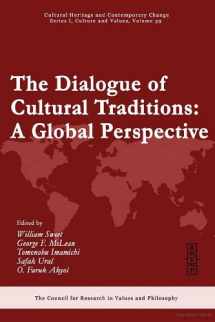
The Dialogue of Cultural Traditions: Global Perspective (Cultural Heritage and Contemporary Change Series I, Culture and Values)
Book details
Summary
Description
In a sometimes radically diverse world, what are the prospects for
the encounter and dialogue of cultural traditions on matters that are central
to life together i.e., on ways of meaning (e.g., self-understanding,
ontologies, ideologies, but also religions), ways of living (e.g., principles
and values in ethics and politics), and ways of knowing (e.g., how we
understand the world and one another)?
These ways are all central to and constitutive of cultural
traditions. They are certainly practical issues; they concern doing, acting,
and developing ourselves and our communities. But they also raise
theoretical issues, and involve uncovering and understanding the
presuppositions and assumptions that underlie and which may serve to
correct our practice.
Philosophy has a distinctive role here. Philosophy is, of course, a
product of cultural traditions. But it can help to discern and define the
issues, as well as engage the plurality of cultures and civilizations which we
encounter in the ongoing process of globalization.
The authors in this volume address the project of the dialogue of
cultural traditions and the role of philosophy by focusing on the abovementioned
constitutive aspects of culture, drawing on their own cultural
traditions, but also employing the tools provided by philosophical analysis.
Indeed, philosophy is preeminently and has been throughout its history,
consistently dialogical. In the West, we may think of Plato s dialogues and
the so-called process of Socratic dialectic, and in the East we have the
dialogue hymns of the Rigveda and the Indian epic Mahabharata.
Throughout the history of philosophy, key texts have been written in the
form of a dialogue: through Augustine and Boethius, the Arabic
philosophers, up to Berkeley, Hume, and the present day. Dialogue has
been used to seek foundations, achieve consensus, reach a state of wide
reflective equilibrium, or attain a fusion of horizons ; clearly, philosophy
has much to contribute to a dialogue of cultural traditions.
What particularly distinguishes this volume is that the interlocutors
provide a genuinely global perspective. Coming from Asia (e.g.,
Kazakhstan, Kyrgyzstan, India, Iran, Pakistan), the Pacific Rim (e.g.,
Australia, Taiwan, the Philippines, China, Vietnam, Indonesia), the Middle
East (e.g., Georgia, Turkey, Iran), Europe (e.g., Austria, Bulgaria, Greece,
Serbia, Spain, the Ukraine, Poland, Russia, Turkey), Africa, (e.g., Nigeria,
Ethiopia, Somaliland, South Africa), and the Americas (e.g., Canada and
the United States), the authors not only provide insight into their own
cultures and traditions, but show some of the successes, failures, and challenges of philosophy in promoting a genuine dialogue among cultural
traditions, as well as outlining some of the prospects for the future.
To speak of a global perspective, however, is not to seek a single
perspective that is above all local perspectives. Nor is it simply a sum
of the ways in which dialogue occurs around the world. Nevertheless, as we
examine and reflect on the various insights provided by the authors, we will
come to see what such a perspective involves, and how dialogue can be
carried out at a global level.


We would LOVE it if you could help us and other readers by reviewing the book
Book review



